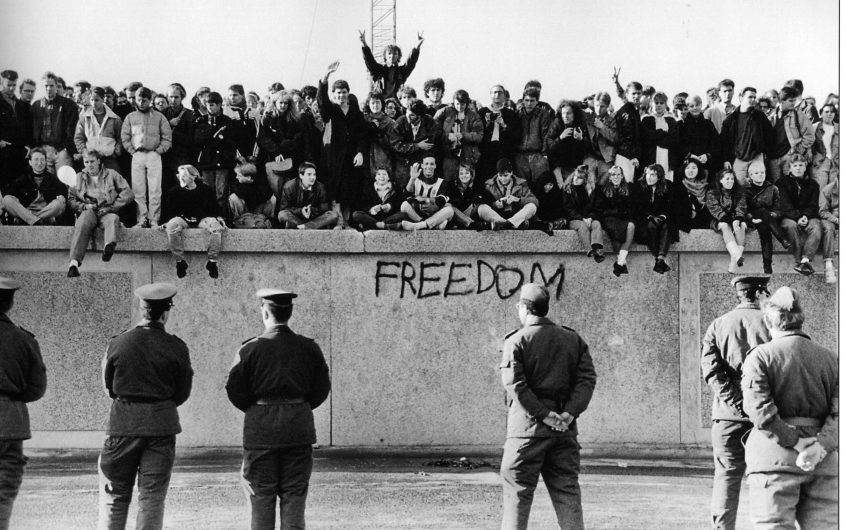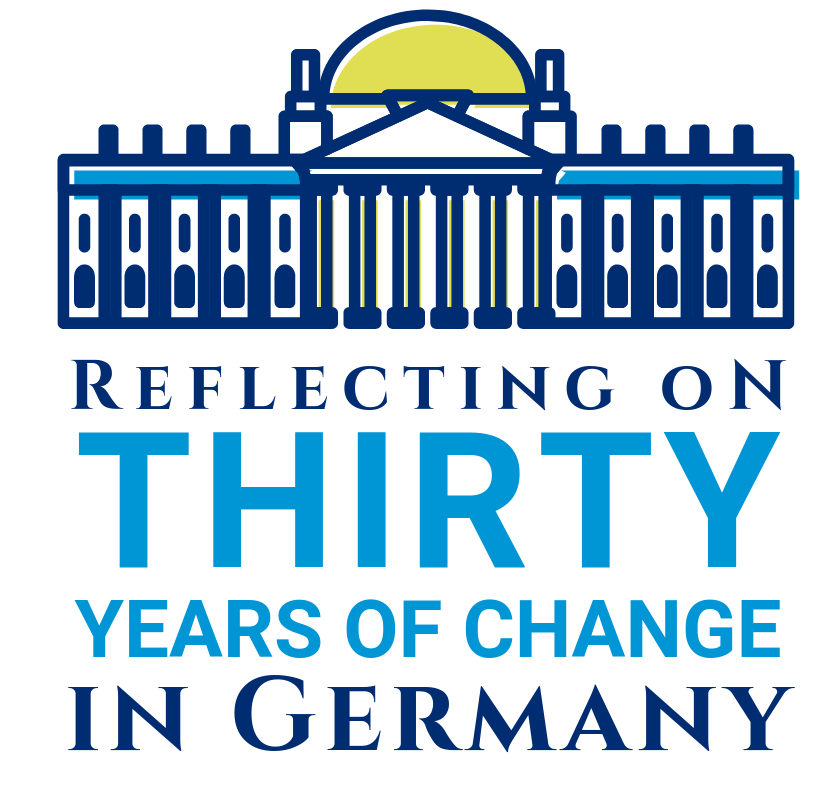
Public Domain via National Guard
The Fall of the Wall as a Memory of Joy

Eric Langenbacher
Senior Fellow; Director, Society, Culture & Politics Program
Dr. Eric Langenbacher is a Senior Fellow and Director of the Society, Culture & Politics Program at AICGS.
Dr. Langenbacher studied in Canada before completing his PhD in Georgetown University’s Government Department in 2002. His research interests include collective memory, political culture, and electoral politics in Germany and Europe. Recent publications include the edited volumes Twilight of the Merkel Era: Power and Politics in Germany after the 2017 Bundestag Election (2019), The Merkel Republic: The 2013 Bundestag Election and its Consequences (2015), Dynamics of Memory and Identity in Contemporary Europe (co-edited with Ruth Wittlinger and Bill Niven, 2013), Power and the Past: Collective Memory and International Relations (co-edited with Yossi Shain, 2010), and From the Bonn to the Berlin Republic: Germany at the Twentieth Anniversary of Unification (co-edited with Jeffrey J. Anderson, 2010). With David Conradt, he is also the author of The German Polity, 10th and 11th edition (2013, 2017).
Dr. Langenbacher remains affiliated with Georgetown University as Teaching Professor and Director of the Honors Program in the Department of Government. He has also taught at George Washington University, Washington College, The University of Navarre, and the Universidad Nacional de General San Martin in Buenos Aires, Argentina, and has given talks across the world. He was selected Faculty Member of the Year by the School of Foreign Service in 2009 and was awarded a Fulbright grant in 1999-2000 and the Hopper Memorial Fellowship at Georgetown in 2000-2001. Since 2005, he has also been Managing Editor of German Politics and Society, which is housed in Georgetown’s BMW Center for German and European Studies. Dr. Langenbacher has also planned and run dozens of short programs for groups from abroad, as well as for the U.S. Departments of State and Defense on a variety of topics pertaining to American and comparative politics, business, culture, and public policy.
__
Few countries have had to grapple with such a complex historical legacy as Germany. Among the many challenging issues arising from this past has the been the dynamic between appropriately remembering and commemorating the negative legacy of dictatorship and genocide, but also the positive side of history—what some scholars would deem “memories of joy.”[1]
Read more on the Fall of the Berlin Wall from AGI
 The fall of the Berlin Wall exactly thirty years ago on November 9, 1989, is precisely one of these memories of joy. Personally, I will never forget the feeling of existential relief I felt at the tender age of 16 when I heard the news. I think many people today have a hard time remembering or, for younger people, grasping the general sense of tension and dread that the Cold War, especially in Germany and particularly in Berlin, had produced. Mutually assured destruction. The Fulda Gap. SS20 missiles.
The fall of the Berlin Wall exactly thirty years ago on November 9, 1989, is precisely one of these memories of joy. Personally, I will never forget the feeling of existential relief I felt at the tender age of 16 when I heard the news. I think many people today have a hard time remembering or, for younger people, grasping the general sense of tension and dread that the Cold War, especially in Germany and particularly in Berlin, had produced. Mutually assured destruction. The Fulda Gap. SS20 missiles.
We also need to remember the series of events that led up to and even seemed to predetermine this outcome—the Polish Roundtable, the opening of the border between Hungary and Austria, the East German refugees in the West German Embassy in Prague, the massive street demonstrations in Leipzig and elsewhere in October and November of 1989. Thus, the fall of the Wall generated a massive sense of exhilaration and catharsis. Everyone seemed to sense that everything was changing fundamentally and irrevocably right before our very eyes.
The fall of the Wall generated a massive sense of exhilaration and catharsis.
Of course, scholarship has shown how contingent these events were. East German official Günter Schabowski mistakenly proclaimed the opening of the border at his famous press conference on November 9. There were several occasions that fall when the East German security forces contemplated a “Tiananmen solution” of massive repressive force. Gorbachev could have been ousted at any point, or could have changed course from his so-called “Sinatra doctrine” that allowed each Eastern bloc country to do things their own way.
Moreover, after just a few days, the joyous festivities started to turn into a hangover as everyone realized just how destabilizing and uncertain the events actually were. I remember feeling shocked talking to my Bavarian-American grandmother—who herself had been speaking to all of the older relatives who lived just ten miles from the inner-German border and who religiously took visitors in the Cold War years to view the border in the Franconian Forest in an early form of “dark tourism.” Almost immediately after November 9 they already worried about how much reunification would cost, how high their taxes would have to rise, and how many Easterners would come to their region and compete for jobs and resources. I imagine that the high-level policy discussions were just as fraught and worried. Certainly, the French and the British shared their misgivings and concerns.
Germans have grappled with how to appropriately accommodate all of the memories that ought to be remembered somehow.
In terms of memory politics, Germany had come to focus on the crimes committed by Germans during the Nazi dictatorship and World War II. This was the “past that would not go away.” Just three years before the fall of the Wall, a years-long public discussion called the Historians Dispute (Historikerstreit) had ended pretty clearly with a victory for those advocating the foregrounding of Holocaust-centered memory and the many lessons associated with that. In 1989/1990, many feared that a necessarily renationalized reunified Germany would just as quickly jettison this memory. I think in the decades since, the exact opposite had been the case, but this was a widespread concern at the time. In addition, a new memory of the East German dictatorship and its victims has suddenly surfaced with the demise of the GDR. Ever since, Germans have grappled with how to appropriately accommodate all of the memories that ought to be remembered somehow.[2]
Finally, the reality of looming German reunification was certainly not joyous. Taxes did rise with the “solidarity surcharge” (Solidaritätszuschlag, or Soli), which still exists. Trillions of DMs and then euros were redistributed from West to East. Economic, social, and demographic upheaval in the East was severe. Unemployment rates in that region were close to 20 percent for several years and are still higher than in the west. Incomes also still lag, and the region’s population has shrunk by 2 million inhabitants. Many of the young—especially women—left and have not come back. Few eastern German companies of a medium or large size have been founded.
Although there was a rather positive mood for the 20th and 25th anniversaries of the fall of the Wall, as the 30th approaches, the mood had soured once again. The resentful memory politics of the Alternative for Germany (AfD), which is increasingly an eastern German party, has clearly exacerbated the situation. There seems to be little appetite for a joyous remembrance this year.
The fall of the Wall is exactly that moment—the culmination of the first (peaceful) German revolution toppling a repressive dictatorship from below after massive civil society mobilization—as well as competent, forward-looking leadership at home and abroad.
But, Germans (and not just their government) should make every effort to recapture that sense of cathartic release, hope for the future, and new opportunity that the fall of the Wall should forever represent. Frankly, there are not a lot of contenders for a memory of joy in Germany—perhaps the four World Cup wins in 1954, 1974, 1990, and 2014. Arguably, all countries need something positive or joyful to remember—in addition to the negative parts of the past. The fall of the Wall is exactly that moment—the culmination of the first (peaceful) German revolution toppling a repressive dictatorship from below after massive civil society mobilization—as well as competent, forward-looking leadership at home and abroad. The event liberated 18 million East Germans and eventually led to unprecedented levels of peace and prosperity across the European continent. Long a reason for concern, Germany became a pillar of stability.
If that is not a memory of joy, I don’t know what ever could be.
[1] Tea Sindbæk Andersen and Jessica Ortner, “Introduction: Memories of Joy,” Memory Studies, vol 12, issue 1 (2019), pp. 5-10.
[2] Hope M. Harrison, After the Berlin Wall: Memory and the Making of the New Germany, 1989 to the Present (Cambridge: Cambridge University Press, 2019).








